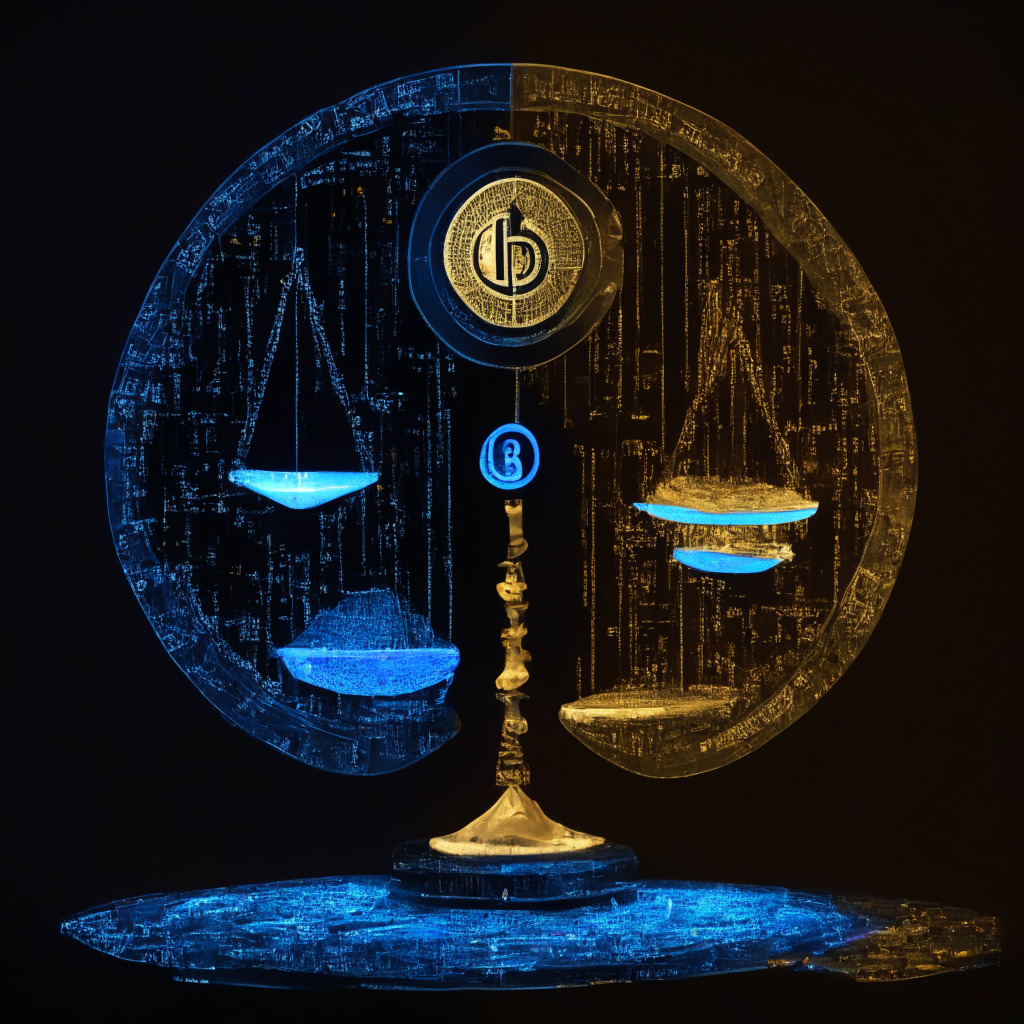“Tether maintains a $3.3 billion liquidity cushion across 15 blockchain ecosystems, bolstering its stablecoin ecosystem. However, concerns about the currency’s liquidity and asset backing persist. Other Tether stablecoins lack the same liquidity cushion, failing to sustain the 1-1 peg in crisis times.”
Search Results for: US SEC
Infiltrating the Infallible: How the FTX and BlockFi Security Breach Dents Our Digital Trust
“A recent security breach has compromised client data from crypto-exchange FTX and lending platform BlockFi. Despite client data tampering, crypto account passwords remain secure. Although the internal systems of FTX and BlockFi were unaffected, concerns arise regarding data misuse and potential vulnerabilities.”
Legal Shifts in Ripple v. SEC: A Game of Musical Chairs and Patricia’s PTK Launch: Building Suspense or Building Concern in Crypto World?
“The ongoing SEC v. Ripple lawsuit takes a fascinating turn with the withdrawal of three SEC attorneys and the addition of new ones, potentially impacting case progression. Meanwhile, Nigerian crypto exchange Patricia launches its native token, Patricia token (PTK), amidst security breach speculations and customer fund access issues, sparking worries of a potential exit scam. These developments underscore existing uncertainties in crypto regulation.”
Quantstamp’s Economic Exploit Analysis: Revolutionizing Blockchain Security or Just Prolonging the Inevitable?
Blockchain security firm Quantstamp introduces the Economic Exploit Analysis service to counter increasing flash loan attacks. This service, developed with the University of Toronto, identifies potential breaches before they wreak havoc, helping to protect DeFi protocols from being exploited and drained by hackers.
Balancer’s Security Flaw: A Perilous Slip or a Bold Demonstration of Crisis Response?
Balancer, Ethereum’s project, recently detected a severe security flaw posing a risk to millions of crypto assets. While emergency response halted numerous pools, roughly 1.4% of the total locked value, approximately $10 million, remains vulnerable. BAL token holders are in strategic withdrawal, and the severity of the vulnerability has not been fully disclosed.
Unraveling the Sam Bankman-Fried Trial: Justice, Blockchain, and the Future of Cybersecurity
“FTX co-founder, Sam Bankman-Fried faces trial in October for seven accusations including fraud and money-laundering conspiracy among others. The report also reveals how cybercriminals are advancing and threats to cryptocurrencies. The SEC recently mandated immediate disclosure of significant cybersecurity breaches.”
SEC Flexes Regulatory Might on Crypto: Innovation Booster or Freedom Buster?
“The SEC has taken action against Titan Global for non-compliance with custody regulations and misleading advertising. Titan made bold claims of up to 2,700% returns with unclear statements on crypto asset custody. The SEC’s stricter approach serves as a reminder about the perils of unchecked engagement in digital asset trading, signaling that a laissez-faire approach to trading digital assets is rapidly becoming a relic of the past.”
Side-Channel Attacks on Crypto Wallets: The New Security Predicament in Blockchain Industry
Side-channel attacks on cryptocurrency hardware wallets are a rising threat. These attacks exploit unintentional leakage of information due to power consumption, electromagnetic emissions, or timing variations. Mitigation strategies include secure hardware design, cryptographic countermeasures, software mitigations, protection against power and timing analysis, and continuous monitoring.
Glow Token vs Crypto.com: The Dilemma of Security, Trust, and Accountability in Cryptospace
“Cryptocurrency startup Glow Token LLC has filed a lawsuit against Crypto.com, alleging a lack of security protocols enabled imposters to defraud them. This highlights the need for transparency and security in blockchain interactions, underscoring the complexity and potential risks within the sector.”
Bitget Imposes Stricter KYC: Enhancing Security or Limiting Genuine Crypto Enthusiasts?
“Singapore-based cryptocurrency exchange, Bitget plans to implement stricter know-your-customer (KYC) protocols from September 1 to quell perceived leniency and potential financial crimes. New users will need to pass level 1 KYC verification, including identity and facial confirmation, otherwise trading rights may be lost.”
Securing Your Digital Gold: Robust Password Management in the Crypto Sphere
This article emphasizes the importance of vigorous password management in the world of blockchain and digital currencies. It focuses on hard-to-crack password creation, use of reputable password managers and multifactor authentication, and secure recovery seed methods to fortify digital assets against online attacks.
Exploring Restaking: Boosting Innovation or Threatening Ethereum’s Security and Consensus?
‘Restaking’ is an emerging concept that is transforming the cryptographic landscape, paving the way for Etherum stakers to earn additional income. However, while it presents an opportunity to extend Ethereum’s decentralized trust to various systems, it also poses potential systemic risks to the ecosystem, highlighted by Ethereum co-founder, Vitalik Buterin.
Navigating the Treacherous Terrain: Crypto-Assets and their Impact on the Banking Sector
“Crypto assets pose significant, complex challenges to the banking sector, as shown in FDIC 2023 Risk Review. Key issues include fast-paced innovation, legal ambiguity, immature risk management, ‘contagion risk’, and ‘stablecoin run’ risks. However, carefully negotiating these challenges could harness innovative benefits.”
Bitcoin’s Fee-to-Reward Ratio: Balancing User Experience, Security and Sustainability
Bitcoin’s fee-to-reward ratio critically impacts transaction speed, network security, and overall stability of the blockchain. In times of heavy traffic, users potentially pay more for quick verification, fostering network efficiency and aiding miners’ profitability. Ultimately, this ratio could dictate Bitcoin’s future economic sustainability.
Regulatory Map: Binance US and SEC’s Discovery Clash Unraveled
“Binance US, the division of the popular digital asset exchange, has appealed against the SEC’s extensive discovery process after being accused of improper registration and mixing user assets. Claiming that the SEC has overstepped the agreement boundaries, Binance US is seeking to limit further intrusions into the company’s operations.”
Balancing Crypto Security: De.Fi’s Antivirus Tool and User Responsibility on zkSync Era Blockchain
De.Fi’s antivirus tool can safeguard users from malicious exploits such as phishing in the crypto industry by providing an additional layer of security. This tool functions by connecting wallets or scanning smart contract addresses on the De.Fi platform. However, successful risk mitigation also relies on the users’ own due diligence and vigilance.
Anthropic Secures $100M Investment from SK Telecom: Assessing the Future of AI in Telecom Industry
“AI developer Anthropic secured a $100 million investment from South Korean corporation, SK Telecom, to create a multilingual large language model for the Telco AI platform. This move represents SK Telecom’s aspirations to revolutionize the telecom industry leveraging AI technology.”
SEC’s Reluctance versus Inevitable Bitcoin ETFs: Struggling Towards a Crypto-Regulated Future
The SEC has again delayed approval of Ark Invest’s proposed spot Bitcoin ETF, citing concerns over potential manipulation and inadequate investor safeguards. Meanwhile, Galaxy Digital CEO and BlackRock are confident of imminent approval. If approved, these ETFs could spark significant institutional investment in Bitcoin, shaping a bullish narrative for 2024.
US-China AI Tug-of-War: National Security or Economic Coercion?
“The US aims to control investments in semiconductors, quantum computing, and AI technologies, leading to global effects. The friction is impacting global trade, with criticism of potential divergence from market principles. In response, China controls export of AI chip-making materials, while other countries contemplate the implications.”
Bitstamp’s Altcoin Trading Suspension: A Reaction to SEC Regulatory Pressures?
Bitstamp, the oldest cryptocurrency exchange, has announced plans to stop the trading of certain altcoins, including Axie Infinity (AXS), Chiliz (CHZ), and Solana (SOL) for US customers from August 29, 2023. This decision seems to follow increased scrutiny from the United States Securities and Exchange Commission (SEC), which has categorized these tokens as unregistered securities.
Cypher’s Crypto Robbery During Hacker House: Unveiling Blockchain Security Pros, Cons and Controversies
“A security incident resulted in the loss of $400,000 from Cypher, a Solana-based decentralized exchange. Seeing Cypher’s team attempt to negotiate with the hackers highlights the importance of robust security and reveals that asset recovery is possible with careful strategy, despite potential risks.”
The SEC’s Covert Crusade Against US Crypto: Potential Collapse or Global Shift?
The U.S. Securities and Exchange Commission’s (SEC) changes in regulatory policies could be sabotaging the resurgence of the blockchain industry. The new rules, perceived by some as covert attempts to regulate crypto out of existence, have led to startups moving offshore and riskier investments for U.S. investors. The shift towards a more merit-based regulatory role by the SEC threatens to restrict financial open-source software and could disqualify operators like Fidelity Digital Assets from acting as custodians.
Massachusetts’ Scrutiny on AI in Securities: Protecting Investors or Stifling Innovation?
Massachusetts authorities have initiated a probe into business interactions with AI, its impact on investors, and its potential misuse in the securities industry. The investigation seeks to ensure AI systems do not subtly prioritize firm interests over clients, reinforcing the need for careful regulation.
Kenya’s Suspension of Worldcoin: A Necessary Security Step or a Hurdle for Crypto Innovation?
Kenya’s suspension of the Worldcoin cryptocurrency project due to security concerns raises questions about the trade-off in security, private data protection, and financial prosperity in the expanding crypto universe. Skepticism exists over Worldcoin’s digital ID system involving sensitive iris scans and potential data misuse. The instance underscores the tension between digital advancement and safeguarding privacy rights in the crypto sphere.
Navigating Bitcoin’s 2023: Market Swings, Security Threats, and Cautious Optimism
Bitcoin is currently unstable due to recent U.S Federal Reserve’s lending rate hikes and a major security breach at Curve Finance affecting Ethereum pools. Despite this, experts still anticipate positive trends for bitcoin spurred by clearer global economic trends.
SEC Accuses Crypto Guru of Billion-Dollar Fraud: An Awakening Call for Enhanced Regulations
The SEC has filed a lawsuit against internet marketer Richard Heart for orchestrating unregistered securities offerings, deceiving investors, and misusing funds. Heart’s projects, Hex, PulseChain, and PulseX, promised immense wealth but have been met with instability and legal troubles. This highlights the necessity for transparency and regulatory compliance in the crypto landscape.
SEC Versus Crypto: Portrayal of Double Standards and Its Impeding Impact on Innovation
Pro-XRP lawyer, John E. Deaton, criticizes the SEC’s approach to cryptocurrency regulation, stating it favors corporate capitalism over protecting individual investors. He argues that this could potentially hinder the growth and innovation within the budding cryptocurrency industry.
Unusual Alliance: SEC and Binance United Against Eeon’s Intervention in Lawsuit
The SEC and Binance have united against an intervention by entity Eeon in an ongoing lawsuit, arguing that Eeon’s intervention doesn’t meet legal prerequisites. This unusual alliance adds a new dimension to the case and may influence future relationships between crypto businesses and regulators.
Unraveling SEC’s Cybersecurity Disclosures: Balancing Investor Trust and Corporate Burden
The Securities and Exchange Commission (SEC) has directed all listed entities, including cryptocurrency enterprises, to annually disclose their “cybersecurity risk, management strategy, and governance.” Firms need to report major cybersecurity incidents within four days, elaborating on the attack’s nature and timing. The new regulation is introduced to fortify investor trust and encourage companies to adopt stringent cybersecurity measures.
Cybersecurity Concerns Amid Phishing Attempts on Defunct FTX Crypto Exchange Users
Users of the defunct crypto exchange FTX are being targeted for potential phishing attempts via unsettling “reset password” requests. This stimulates fear regarding blockchain technology’s claim of secure future versus present vulnerabilities in the crypto market. Reinforcing personal cybersecurity measures is encouraged to ward off phishing attempts.
Navigating Regulatory Rifts: US Congressional Discourse on the SEC’s Approach to Crypto Regulation
“Bitcoin and blockchain technology’s global influence faces regulatory scrutiny. Skepticism towards the US Securities Exchange Commission’s approach to cryptocurrency regulation is voiced by senior Republican members. Accusations of targeting crypto for publicity rather than comprehensive legislation prompt concerns about customer protection and compliance.”
US Congress Critics Challenge SEC’s Approach to Crypto Regulation
“US representatives French Hill and Dusty Johnson question SEC chairman Gary Gensler’s approach to digital asset regulation. They suggest that shaping legislation is a more potent tool for resolving regulatory issues in the digital asset space, offering firms guidance and bolstering customer protection.”































